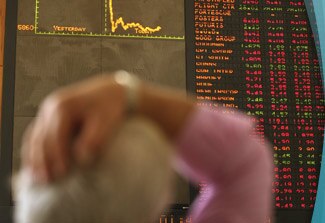Sliding super still the way to go
DON'T panic about your super savings despite the diabolical state of the sharemarket, experts say.

Sliding super still the way to go
DON'T panic despite the diabolical state of the sharemarket.
Australia's $1.1 trillion superannuation market has lost roughly 11 per cent in the past 15 months but it offers the most tax-effective way to save for retirement.
Still - if you were planning on retiring next year, you might need to hang on at work for a bit longer.
Investment and Financial Services Association chief executive Richard Gilbert recommends people "take a long deep breath and don't jump off the cliff''.
"It has been a bloodbath on the markets but super is still the tax-preferred way to save,'' Mr Gilbert said.
"Check with your fund and see what the actual returns have been as no one has lost as much as the ASX or NYSE.''
Four out of five Australian workers are in their company's default or balanced fund which means 65 per cent of their retirement nest eggs are invested in Australian and international shares.
Jeff Bresnahan, managing director of leading independent research house SuperRatings, said people approaching retirement were the most affected by this "diabolical September''.
"They've lost more and more money, and may have to consider staying in the workforce for another year or two but if you've got decades left in the system, then don't panic,'' Mr Bresnahan said.
"A lot of people are nervous but switching to cash is not the answer as you are betting that the market has a long way to go down.''
An average balanced fund lost 6.4 per cent in the year to June, and SuperRatings estimates funds have lost another 5 per cent since June.
Mr Bresnahan said salary sacrificing into super was still more attractive than other investment strategies.
"People salary sacrifice to boost their retirement savings and if you stop that what else will you do that is so tax-advantageous? If you want to reduce your risk, you could sacrifice into cash.''
If you wanted to retire tomorrow on $500,000 and you now had $450,000 in your super, a fall of 10 per cent, you'll probably have to work for another two years to recoup the loss.
Sunsuper chief executive Tony Lally said falling markets provided buying opportunities for investors but the trouble was that "no one knows where the bottom is''.
Mr Lally said wise heads kept their cool in markets such as this and it was too hard to time the market.
Surviving the market meltdown
DON'T PANIC
Many people may be tempted to move their money out of the share market during times of volatility or weakness. Peaks and troughs are an intrinsic part of investing. If you move out of the market, then you won't be there for the recovery, which can sometimes arrive unexpectedly and take off quickly.
MARKETS MOVE IN CYCLES
Investment markets move in cycles. It is impossible to predict when a market will rise or fall.
MARKETS ALWAYS RECOVER
Despite short-term volatility, the market always recovers. Even after the crash of 1929 the share market eventually recovered, although it did take more than 10 years. The good news is that, since the 1960s, the recovery period has been shorter, typically less than five years.
AVOID BUBBLES
Remember markets are unpredictable - those investing for a quick win at the height of the tech bubble paid a premium for their assets and would not have foreseen the tech crash that followed.
DIVERSIFICATION REDUCES RISK
It is impossible to predict market movements accurately.
Attempting to do so is little more than speculation. However, you can reduce the impact of market movements by diversifying your portfolio.
Source: ISFA/Morningstar



